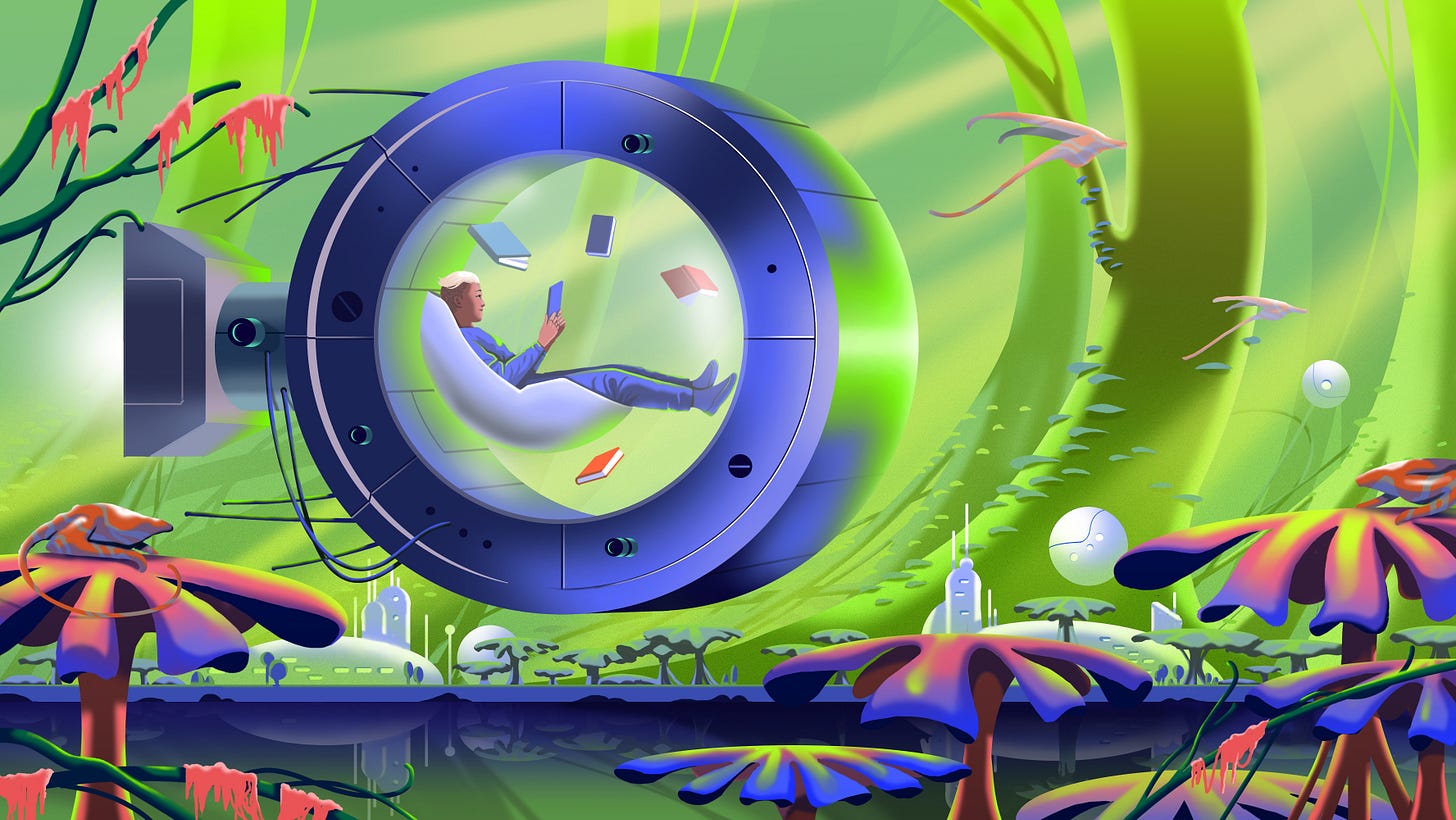The Possibility Engine
Flex your imagination with speculative fiction.

The present is reality’s workshop. It is where scientists, engineers, entrepreneurs, teachers, artists, activists, farmers, journalists, and policymakers collectively construct the world we inhabit. The present is where things happen. We live at the crest of the breaking wave of time.
As soon as we make something, it becomes part of the past, a brick in history’s foundation. The moment we pass a law, adopt a puppy, discover a new scientific principle, publish a blog post, solve a problem, start a business, or ask someone on a date, it forms the context for the next moment. We stand in the present, forging the past.
The future is not our destination. It is our great constraint: We can only build what we can imagine. The future is a story we tell ourselves about ourselves, a shared dream to be realized through shared effort, a horizon of infinite possibilities limited only by our vision.
The future consists not of atoms or bits, but imagination. It is not the endpoint of a deterministic trend, but contingent and always subject to reinvention. The future is a question to be answered by what we choose to do next.
We all imagine possible futures all the time. What do we want to be when we grow up? What should we make for lunch? What if we dropped everything to travel to a distant land? What kind of world are we leaving to our children? To be human is to speculate.
Speculative fiction takes these “what if” questions further by weaving thought-experiment into narrative. What if genetic engineers resurrected dinosaurs? Read (or watch) Jurassic Park. What if we reinvented democracy for the internet age? Read Infomocracy. What if a lone astronaut got stranded on Mars? Read (or watch) The Martian. What if a single human being sought to reclaim utopia from dystopia? Read Parable of the Sower. What if we establish a new institution empowered to represent the interests of future generations? Read The Ministry for the Future. What if our digital lives subsumed our physical lives? Read Neuromancer. What if a billionaire hijacked the climate with geoengineering? Read Veil. What if we used our political, cultural, and technological powers to build a kinder world order? Read Too Like the Lightning.
People think in stories. Stories ground ideas in human experience and mint new metaphors that reveal how the world is changing—imagine trying to discuss state surveillance without Nineteen Eighty-Four or living in a simulation without The Matrix. As these stories ripple out through the culture, the imaginary futures they portray influence the world we build for ourselves. The rocket scientists who took humanity to the moon found their vocations thanks to the stories of Jules Verne and HG Wells. WarGames prompted Congress to pass the first anti-hacking law. The founders of Oculus handed out copies of Ready Player One to early employees, and books from authors like Ted Chiang, Neal Stephenson, Cixin Liu, and Isaac Asimov fill Silicon Valley bookshelves. N.K. Jemisin’s world-building informs how leading journalists like Ezra Klein make sense of the real world. Ursula K. Le Guin’s books influenced a generation of musicians. Edward Snowden carried a Cory Doctorow novel with him when he fled the United States to blow the whistle on the NSA. Watching Contagion prompted the British Health Secretary to order extra COVID-19 vaccines for the United Kingdom. A crucial scene in Star Trek: The Next Generation helped Stacey Abrams see how to change the rules of political engagement in Georgia.
Speculative-fiction writers riff on reality like jazz musicians riff on standards, summoning strange new worlds, challenging assumptions, and subverting expectations. By journeying through these invented worlds, readers flex their own speculative muscles. Yoga for the imagination is invaluable in an evolving world where flexibility enables resilience. The more options we can envision, the more choices we have. Speculative fiction is the mythology of accelerating change—an invitation to curiosity, an engine of possibility.
Speculative fiction is a lot of fun, and “for fun” is a perfectly good reason to enjoy it, no need to qualify with “just.” But don’t be surprised if you come away with new ways of seeing the world, and of identifying anomalies worthy of further investigation. Because exploring alternate realities reveals the interlocking contingencies of the status quo, speculative stories may prove useful not just to those imagining the future, but those who seek to invent it.
Eliot Peper is the author of Reap3r, Veil, Breach, Borderless, Bandwidth, Neon Fever Dream, Cumulus, Exit Strategy, Power Play, and Version 1.0. He also works on special projects and tweets more than he probably should.
“Whatever Peper writes about is what we'll be talking about for the next year, and grappling with for the next decade.”
-James Cham, partner at Bloomberg Beta, on Reap3r

